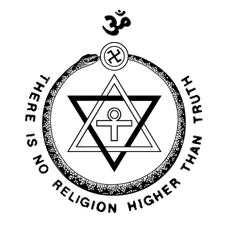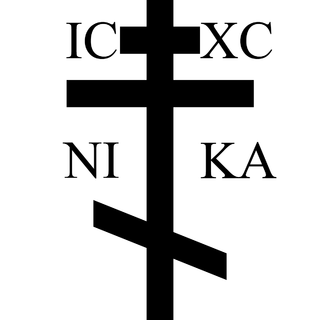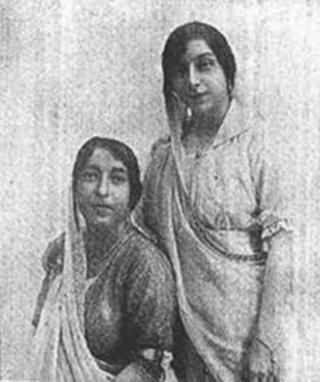Related Research Articles

The Theosophical Society is the organizational body of Theosophy, an esoteric new religious movement. It was founded in New York City, U.S. in 1875. Among its founders were Helena Blavatsky, a Russian mystic and the principal thinker of the Theosophy movement, and Henry Steel Olcott, the society's first president. It draws upon a wide array of influences among them older European philosophies and movements such as Neoplatonism and occultism, as well as parts of Asian religious traditions such as Hinduism, Buddhism, and Islam.

Annie Besant was a British socialist, theosophist, freemason, women's rights and Home Rule activist, educationist, and campaigner for Indian nationalism. She was an ardent supporter of both Irish and Indian self-rule. She became the first female president of the Indian National Congress in 1917.

Bhagwan Das was an Indian Theosophist and public figure. For a time he served in the Central Legislative Assembly of British India. He became allied with the Hindustani Culture Society and was active in opposing rioting as a form of protest. As an advocate for national freedom from the British rule, he was often in danger of reprisals from the Colonial government. He was awarded the Bharat Ratna in 1955.

The Theosophical Society in America (TSA) is a member-based nonprofit organization dedicated to the teaching of Theosophy and affiliated with the international Theosophical Society based in Adyar, Chennai, India. The name "Theosophical Society in America" was legally adopted by the American Theosophical Society in 1934. Previously, other organizations had used the same name during the years 1895–98 and 1898–1908.

Occult Chemistry:Investigations by Clairvoyant Magnification into the Structure of the Atoms of the Periodic Table and Some Compounds is a book written by Annie Besant and C.W. Leadbeater, who were both members of the Theosophical Society based in Adyar, India. Besant was at the time the President of the Society having succeeded Henry Olcott after his death in 1907.

Rukmini Devi Arundale was an Indian theosophist, dancer and choreographer of the Indian classical dance form of Bharatanatyam, and an activist for animal welfare.

Morya, also spelt Maurya, is one of the "Masters of the Ancient Wisdom" within modern Theosophical beliefs. He is believed by followers of Theosophism to be one of the Mahatmas who inspired the founding of the Theosophical Society and was engaged in a correspondence with two English Theosophists living in India, A. P. Sinnett and A. O. Hume. The correspondence was published in 1923 by A. Trevor Barker, in the book The Mahatma Letters to A. P. Sinnett.

George Sydney Arundale was a Theosophist, Freemason, president of the Theosophical Society Adyar and a bishop of the Liberal Catholic Church. He was the husband of the Indian dancer Rukmini Devi Arundale.

Radha Burnier was born in Adyar, India. She was president of the Theosophical Society Adyar from 1980 until her death in 2013. She was General Secretary of the Indian Section of the Society between 1960 and 1978, and was previously an actress in Indian films and Jean Renoir's The River.

Curuppumullage Jinarajadasa was a Ceylonese author, occultist, freemason and theosophist. The fourth president of the Theosophical Society, Jinarajadasa was one of the world's foremost Theosophical authors, having published more than 50 books and more than 1600 articles in periodicals during his life. His interests and writings included religion, philosophy, literature, art, science and occult chemistry. He was also a rare linguist, who had the ability to work in many European languages.

The Theosophist is the monthly journal of the international Theosophical Society based in Adyar, India. It was founded in India in 1879 by Helena Blavatsky, who was also its editor. The journal is still being published till date. For the year 1930, the journal was published in Hollywood, California by Annie Besant and Marie Russak Hotchener, but it returned to Adyar in 1931. The journal features articles about philosophy, art, literature and occultism.

Ernest Egerton Wood was a noted English yogi, theosophist, Sanskrit scholar, and author of numerous books, including Concentration – An Approach to Meditation, Yoga and The Pinnacle of Indian Thought (1967).

Sir Thyagaraja Sadasiva Iyer was an Indian judge and theosophist who served as the Chief Justice of Travancore from 1905 to 1910. He was also the first President of the Hindu Religious and Charitable Endowments Department, Madras Presidency.

Margaret Elizabeth Cousins was an Irish-Indian educationist, suffragist and Theosophist, who established All India Women's Conference (AIWC) in 1927. She was the wife of poet and literary critic James Cousins, with whom she moved to India in 1915. She is credited with preserving the tune of the Indian National Anthem Jana Gana Mana based on the notes provided by Tagore himself in February 1919, during Rabindranath Tagore's visit to the Madanapalle College. She was a member of the Flag Presentation Committee which presented the National Flag to the Constituent Assembly on 14 August 1947.

Christianity and Theosophy, for more than a hundred years, have had a "complex and sometimes troubled" relationship. The Christian faith was the native religion of the great majority of Western Theosophists, but many came to Theosophy through a process of opposition to Christianity. According to professor Robert S. Ellwood, "the whole matter has been a divisive issue within Theosophy."
Stri Dharma was the magazine of the Women's Indian Association which was first published in January 1918 by two Theosophist feminists –Margaret Cousins and Dorothy Jinarajadasa– and continued until August 1936. Its title was Sanskrit for the dharma of women: their right way.
The Women's Indian Association (WIA) was founded at Adayar, Madras, in 1917 by Annie Besant, Margaret Cousins, Dorothy Jinarajadasa, and others to liberate women from the deplorable condition women suffered in socio-economic and political matters during the 19th and the early 20th century. The Association later developed into a potent force to fight against illiteracy, child marriage, the Devadasi system and other social ills. After Besant's death in 1933, Dorothy Jinarajadasa became more involved in the internal politics of theosophists. The faction she supported fell from favour, and her name stopped appearing in all documents from that point onward.

Herabai Tata (1879–1941) was an Indian women's rights activist and suffragist. Married in 1895, Tata's husband was progressive and supported the education of his wife and daughter, hiring tutors to help her with her schooling. In 1909, Tata, who was Parsi, developed an interest in Theosophy and within a few years made the acquaintance of Annie Besant. Around the same time, in 1911, she met Sophia Duleep Singh, a British suffragist with Indian heritage, who influenced her development as a suffragist. A founding member and the general secretary of the Women's Indian Association, she became one of the women who petitioned for enfranchisement before the Montagu-Chelmsford investigation in 1917.
The Women's suffrage movement in India fought for Indian women's right to political enfranchisement in Colonial India under British rule. Beyond suffrage, the movement was fighting for women's right to stand for and hold office during the colonial era. In 1918, when Britain granted limited suffrage to women property holders, the law did not apply to British citizens in other parts of the Empire. Despite petitions presented by women and men to the British commissions sent to evaluate Indian voting regulations, women's demands were ignored in the Montagu–Chelmsford Reforms. In 1919, impassioned pleas and reports indicating support for women to have the vote were presented by suffragists to the India Office and before the Joint Select Committee of the House of Lords and Commons, who were meeting to finalize the electoral regulation reforms of the Southborough Franchise Committee. Though they were not granted voting rights, nor the right to stand in elections, the Government of India Act 1919 allowed Provincial Councils to determine if women could vote, provided they met stringent property, income, or educational levels.
Josephine Maria Ransom, née Davies (1879-1960) was an Australian Theosophist and writer. She served as General Secretary of three different national sections of the Theosophical Society, and wrote A Short History of the Theosophical Society. Ransom was also Honorary Secretary of the Britain and India Association, and editor of its magazine Britain and India.
References
- ↑ "Theosophy Cardiff's Gallery of Great Theosophists". ardifftheosophy.walestheosophy.org.uk. Retrieved 12 May 2024.
- 1 2 3 Forbes, Geraldine; Forbes, Geraldine Hancock (1999-04-28). Women in Modern India. Cambridge University Press. p. 72. ISBN 978-0-521-65377-0.
- ↑ Lutyens, Mary (1997). Krishnamurti: The Years of Awakening. Shambhala Publications. ISBN 978-1-57062-288-5.
- 1 2 3 4 5 6 7 Mukherjee, Sumita (2018-04-16). Indian Suffragettes: Female Identities and Transnational Networks. Oxford University Press. pp. 48–54. ISBN 978-0-19-909370-0.
- ↑ Forbes, Geraldine Hancock (2005). Women in Colonial India: Essays on Politics, Medicine, and Historiography. Orient Blackswan. p. 16. ISBN 978-81-8028-017-7.
- 1 2 3 Broome, Sarah (2012-08-01). "Stri-Dharma: Voice of the Indian Women's Rights Movement 1928-1936". History Theses.
- ↑ Woollacott, Angela (2001-08-30). To Try Her Fortune in London: Australian Women, Colonialism, and Modernity. Oxford University Press. p. 130. ISBN 978-0-19-534905-4.
- ↑ Menon, Nitya (2015-03-08). "When Madras' women won the vote". The Hindu. ISSN 0971-751X . Retrieved 2022-01-06.
- ↑ Sandell, Marie (2015-01-26). The Rise of Women's Transnational Activism: Identity and Sisterhood Between the World Wars. Bloomsbury Publishing. ISBN 978-0-85773-730-4.
- ↑ Sluga, Glenda; James, Carolyn (2015-06-12). Women, Diplomacy and International Politics since 1500. Routledge. p. 202. ISBN 978-1-317-49703-5.
- ↑ Siegel, Mona L. (2020-01-07). Peace on Our Terms: The Global Battle for Women's Rights After the First World War. Columbia University Press. ISBN 978-0-231-55118-2.
- ↑ Majumdar, Maya (2005). Encyclopaedia of Gender Equality Through Women Empowerment. Sarup & Sons. ISBN 978-81-7625-548-6.
- ↑ Dixon, Joy (2003-05-01). Divine Feminine: Theosophy and Feminism in England. JHU Press. pp. 208, 217–8. ISBN 978-0-8018-7530-4.